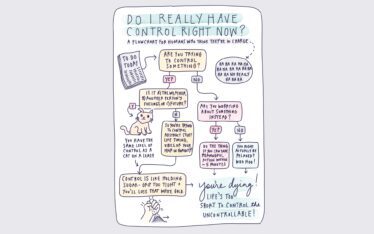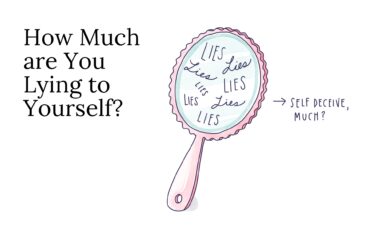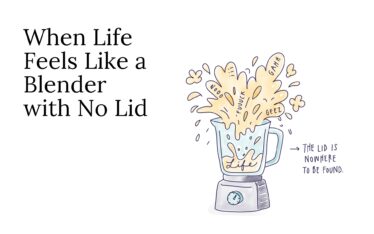Humans. We think we’re so damned smart, don’t we? Most of us are idiots—present company ruefully included—but there’s one rather problematic area where we actually are so damned smart: We’re acutely aware that we’re going to die. We know we’re ticking time bombs … that we’re finite … that we’re—brace yourself—FRAGILE. And that doesn’t tend to sit well with us, does it?

Andy, our existentially ignorant cat, attacking his catnip pickle.
Social psychologists say we’re the only species who’ve been bestowed this extra-special gift of mortality awareness. Your dog, my cat, and the chipmunk out the window are all living in beautiful, blissful ignorance. It would be nice to think you could bat your stuffed catnip pickle around for all of eternity, wouldn’t it? Those poor creatures; if only they knew what was in store for them.
Because we know we’re Limited Time Only specimens, we find ways to sooth ourselves. We’re not always cognizant that we’re pacifying ourselves, and that’s okay because these mind games are what keep our subconsciousness gainfully employed. Wait—should we talk about Terror Management Theory now? I think it’s time to talk about Terror Management Theory now. And then we’ll talk about money.
Terror Management Theory (TMT) 101
Lest you not find the field of death studies as scintillating as some of us here (hi!), I’ll soften the academic blow with an easy, step-by-step explanation of TMT…
Step 1: When we’re reminded of our mortality in some way (like driving by a car crash … attending a funeral … reading about war in the news … watching any Liam Neeson movie …) …
![]() Step 2: We don’t enjoy the fact that we’re temporary (because as humans we’re built with a desire to remain alive and maybe even contribute something to the world. Not all of us care about the contribution part so let’s just stick with the will towards continued existence part.) …
Step 2: We don’t enjoy the fact that we’re temporary (because as humans we’re built with a desire to remain alive and maybe even contribute something to the world. Not all of us care about the contribution part so let’s just stick with the will towards continued existence part.) …
![]()
Step 3: So we manage this existential discomfort (terror) in two ways:
3a: We double-down on our worldviews—the beliefs that make us feel like we’re part of something bigger that’ll live beyond our lifespans (like our religion, our political group, our alumni association, our cultural codes of conduct, etc.). Being a part of these “in-groups” reassures us with what’s called “symbolic immortality.” We’ll bite the biscuit, but we might get into heaven (the ultimate immortality). We’ll die, but the flag from our country will still wave in the wind—that kind of thing. Symbolic immortality is irrational but it feels good deep down in places we can’t quite put our finger on.
![]()
3b: We try to bolster our self-esteem (which is contingent on how well we’ve been good little boys and girls who’ve adhered to the worldviews we’ve signed up for). If our culture values beauty, we might spruce up our faces and bodies when we’re reminded of the morgue. If our political party or culture values capitalism, we’ll boost our self-esteem by Taking Care of Business, Hustling Harder to Get Shit Done! When we’re reminded of death, we might donate dough to the local hospital expansion, and feel good about seeing our name etched into a brick on the side of the new wing.
![]()
Step 4: Then we end up dying (hopefully after a long and lustrous life).
Where does money come into all of this?
 One way to feel better about not being around forever is to boost our self-esteem through money, and while money can’t buy love (for more than an evening at a cheap hotel, I suppose), it can ease the Existential Angsties.
One way to feel better about not being around forever is to boost our self-esteem through money, and while money can’t buy love (for more than an evening at a cheap hotel, I suppose), it can ease the Existential Angsties.
Researchers helpfully bucket our relationship to money into two categories:
- Money as a tool—money is an “effective facilitator of exchange”: we get our hands on it, we use it to buy a waffle maker, and then we make waffles.
- Money as a drug—money is viewed as “a reward in and of itself due to the needs it fulfills or promises to fulfill, psychological or otherwise”: we want money so it can fill empty holes (waffle-shaped holes, for some of us 😬) inside of ourselves. Money as a drug means we believe it might lead to respect, happiness, belonging, and a host of other (maple syrup-covered) drug-induced notions … like reducing the discomfort that comes from mortality awareness.
Studies reinforce the role money plays as “part of an anxiety buffering system that shields people from the potential for overwhelming anxiety resulting from their awareness of life’s finite and fragile nature.” They report that “money can fulfill the critically important psychological function of keeping existential anxiety at bay, acting like an existential drug in a sense.”
So what do we do with this drug? “Just say no” or go on a bender?
If money, wealth, and possessions can buffer existential anxiety, should we spend our hard-earned dough or save it? There is no one clear answer, so see what points resonate here with you:
- Mortality reminders typically increase our desire for conspicuous consumption; studies reveal that participants “report higher financial expectations for themselves in the future, and expect to spend more money on pleasurable consumption such as clothing, entertainment, and leisure activities.”
- Mortality prompts caused participants in one study to covet high-status luxury products like Lexus cars and Rolex watches. Bottom line: spending money can help us cope with our death discomfort—like a cheap high that doesn’t last long.
- On the flip side, saving money can provide us with a sense of control over our future, security, freedom, and independence—which can shield us against death anxiety.
- Accumulated savings and assets passed down to future generations can provide that symbolic immortality reassurance … “I might be in the grave but my estate will cover little Timmy’s education.”
- Research reveals that more than half of us would rather “save for tomorrow than live for today” (a point that sounds very responsible but also alarming for someone—moi—who’s gravely concerned about postponing our existence).
The jury is still out re: what will save you from the embers of existential anxiety. You need to pick the one that whispers sweet relief to you… to spend your cash or hoard your cash… or a bit of both?
Sure—our most elevated, top-of-the-self-actualized-pyramid selves wouldn’t need a spend-it or save-it drug to cope with the harsh realities of living and dying. We’d be brave enough to grapple with our mortality every time it made itself present; we’d face it head on and never distract or deny the inevitability. (It’s in this same “us at our best” fantasy where we exercise every morning and never order fries with extra mayo on the side for dipping. Not bloody likely.)
We need a wee numbing every now and then, and while hard drugs are off the table, money is like an innocent little Advil worth popping every once in a while when we’re slapped in the face with mortality awareness. Hey—whatever gets you through your days (and long dark nights of the soul).
If spending floats your boat (and it won’t bankrupt you), enjoy the new watch. If saving makes you feel like a million bucks and keeps fears of the Grim Reaper at a comfortable distance, then bulk up your 401(k). But promise me you’ll still make an effort to face the facts of life… as T.S. Eliot said,“Birth, and copulation, and death. That’s all the facts when you come to brass tacks: Birth, and copulation, and death.”

P.S.: Spend $30 USD by preordering my book, You Only Die Once: How to Make It to the End with No Regrets!
P.P.S.: Let’s do Instagram together?
P.P.P.S.: Oh and just in case you missed it… I’d love you forever if you took 16 minutes out of your life to watch my TEDx talk!






